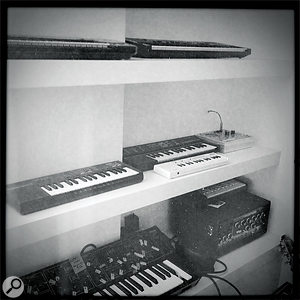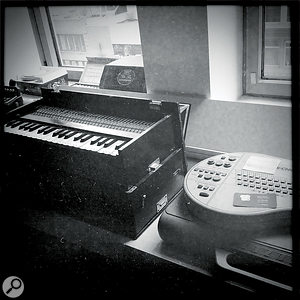Benny Blanco has created a string of number one hits without expensive instruments or virtuoso keyboard skills. What exactly is his secret?
21st Century pop songs tend to be created by teams of people, with the roles of artists, writers and producers continuously overlapping in ever-changing credit mosaics. And so it was that, early in 2010, Katy Perry and singer-songwriter Bonnie McKee were in the throes of writing what would become one of the biggest hits of the year, 'Teenage Dream'. The duo apparently rewrote the song at least four times, and in typical 21st Century fashion, showed their efforts to Dr Luke, one of today's leading pop music writer/producers. In an interview, McKee recalled that Luke wasn't impressed, stating that it had to be "Benny-proofed” because "if Benny doesn't get it, America won't get it”. Cue several more rewrites of the song.
The Benny in question is Benny Blanco, a 24-year old writer/producer, who has, during the last four years, had a hand in the creation of no fewer than 18 American number one pop songs, including four by Perry, five by Ke$ha, two by 3OH!3, and songs by Taio Cruz, Sean Kingston, Gym Class Heroes and Maroon 5. Blanco was discovered and groomed by Dr Luke, and has gone on to work with pop production legends such as Shellback and Max Martin, as well as branching out on his own.
"Yeah, they always say in the studio that things have to be 'Benny-proofed',” laughs Blanco. "I do listen to a lot of music to be able to keep in touch with what's happening. I probably download 100 songs a day! I go through a lot of music every day after waking up. I skim through it all, and if something catches my ear, I'll listen to the whole song. Other than that, I don't really listen to modern pop music. For pleasure, I listen to a lot of oldies, a lot of R&B, old rock, some punk, old hip-hop, all different things. Everything but the pop music of today. It's not that I dislike it; it's just that I'm more interested in the older stuff. It's more creative.”
His own account of the gestation of 'Teenage Dream' confirms McKee's. "We rewrote that song seven times! You keep cracking away at it, and you know when it is right. You really have to grab people. A song has to be captivating and it has to be relate-able. Nobody wants to listen to a song they can't relate to. A song needs to grab people's attention within the first 10 seconds, otherwise they're going to the next song. And you have to hold their attention for the entire duration of the song. A song today is like an hour-long DJ set condensed into three minutes. You start, you build things up, you bring them back down, you build them up again. There continuously has to be something exciting to the ear, and that has to keep changing throughout the song. The structure of the song, every time it changes — ie. intro, verse, pre-chorus, chorus — has to be signposted. You can't just flow things, it has to be like 'Bam! A new part is coming in!' Even if it's not immediately apparent, on some level the listener has to go: 'Oh, wow, that sounds different!'”
School Of Hard Knocks
 Benny Blanco's selection of cheap home keyboards has served him well — in particular the Yamaha model that helped to create Katy Perry's 'Teenage Dream' and 'California Gurls'.
Benny Blanco's selection of cheap home keyboards has served him well — in particular the Yamaha model that helped to create Katy Perry's 'Teenage Dream' and 'California Gurls'.
Born Benjamin Levin in New York, in 1988, Blanco's rise to the top has been dazzlingly fast, although a lengthy period of groundwork preceded it. He got into music aged four, and his parents sent him on guitar, piano and drum lessons ("I would switch instruments every week”) and groomed him in many different types of music. The teenage Blanco aspired to be a rapper, but when he saw Eminem, decided that the world didn't need another white rapper, and started making hip-hop beats using two boomboxes and the sound-on-sound process. At his parents' request, he studied audio engineering at the Institute for Audio Research in New York, and his first professional gig was doing the beats for a soft-porn video called Hip-Hop Honeys (presumably not something instigated by his parents).
Blanco then bugged top producer Disco D into hiring him as his assistant, and after D committed suicide in 2007, the teenager went on to work with Spank Rock. The duo got a record deal and released an EP called Bangers & Cash in 2007. A publishing deal led to Blanco being introduced to Dr Luke, and from there his career trajectory went skywards. Blanco's first big splash was Britney Spears' song 'Circus', which was co-written by Luke, Blanco and Claude Kelly, co-produced by Luke and Blanco, released in December 2008 and sold almost three million copies in the US alone.
Blanco is always keen to praise the talents of those he has worked with, including Disco D, whose tough love methods included at one point erasing Blanco's entire hard drive full of his beats, and at another, throwing his CDs out of the window. "Yeah, he treated me like Mr Myagi [the karate teacher in The Karate Kid], and I was like his grasshopper!” recalls Blanco. "I'd do loads of menial tasks during the day, but then every day he'd give me five minutes of really showing me how he did things and this helped me go to the next level. Working Luke was the next big step up, and it was also very different because I had never worked in pop music before. It was something foreign to me. I had always just made stuff and not thought about whether other people would like it or whether it would work on the radio or what the masses would think of it. I had just been making music because I love it. I guess you could say that I worked more in an indie background, like when I was working with Spank Rock, which was fun and the first thing I did that took off. But I owe much of my big success to Luke, and I'm lucky that I'm surrounded by such talented people all the time, that can bring the best out of me, and allow me to bring the best out of them.”
California (Teenage) Dreaming
 'Toy' instruments at Blanco's studio, including a Casio VL1, Indian harmonium, Suzuki Omnichord, a ukulele and a child's glockenspiel.
'Toy' instruments at Blanco's studio, including a Casio VL1, Indian harmonium, Suzuki Omnichord, a ukulele and a child's glockenspiel.


Being "surrounded by such talented people” involves a lot of travelling from studio to studio and coast to coast, co-writing and co-producing tracks with different production teams and artists. 'Teenage Dream' was a typical and rather striking example. "I had just driven from New York to Los Angeles,” Blanco recalls, "so I was pretty tired when I arrived, and thought I'd just drop by the studio to say hello before going to bed. We were just chilling in the lounge, because I don't like big studios, and for the same reason we usually have a Pro Tools setup in the lounge. Luke said, 'Let's make something that sounds like Prince,' and I was like, 'I'm tired, but OK then.' I had one 25-buck child's keyboard, and Luke was playing bass and guitar, and we put down two quick ideas in 30 minutes. They went to the back of the folder, and no-one thought about them until we were in the room with Max [Martin] one day and he's so good at writing melodies. We loaded these two ideas and he was spitting things out that sounded great and that eventually became 'Teenage Dream' and 'California Gurls'. We then worked on it with Katy and McKee, who wrote lyrics and more melodies.
"My role when writing and producing songs is different every time. The best way to approach producing is to know how to fit in, how to be the missing piece. Many people try to do too much and they get in the way, often by doing things they are not good at. But if someone in the room is better than me at something, I'm going to let them do it. If someone is a better guitarist, I'll let them play the guitar. I have no ego about that. The best producers are those that can bring out the best in everyone, who can really use people for their strengths and talents. Sometimes you write more of a song, sometimes less, sometimes you produce more, sometimes you're just there for moral support, sometimes you do the lyrics, sometimes you're just involved with the music, it all depends. If someone has a big ego, they are not going to make it in this business.
"Producing is about making everyone feel comfortable and making them feel that their ideas matter and are being used. It is all about setting the ambience. That's the most important thing and it's why I'm no fan of big studios. If you're going to record a happy song, and you're not happy, the song is going to sound like shit. I had an artist in yesterday and we were cutting a song with a certain vibe, and he wasn't feeling it. If someone isn't feeling the vibe, you can't force them, you have to wait until they are in that zone. I'm recording in a bedroom, and there's a bed in the centre of it. I started making music in a bedroom and I have to feel like I'm still working like that, so I make sure there always is a bed in every studio I work in. It makes it a little less formal.
"Working with the artist is the single most delicate and important aspect of producing. You have to massage the situation and you have to pick your battles well. Artists are going to fight you on things, they are strong-minded people. If there's something that they have written that you don't like, you may choose not to fuss over it yet. Instead, you let them do their thing, and you make a mental note to come back to it later. Producing is a lot about making mental notes! You make the person feel comfortable and relaxed enough to share things with you. I do many different things to achieve that — like I usually put a playlist together before a session with an artist, with music in the direction that we want to go in or something that will get us into the right vibe. Before the session, we'll just listen to music for an hour, and we'll dance and sing and get into the vibe.”

